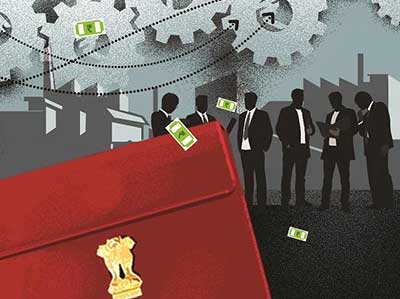Date: 01/03/2023
Relevance: GS-3: Indian Economy and issues relating to planning, mobilization, of resources, growth, development and employment. Government Budgeting.
Key Phrases: Budget, Investments, Competitive Populism, Welfarism, Expenditures, Subsidy, Revdi Culture, RBI, ASER, Health, Education.
Context:
- States are prioritizing handouts over the creation of sustainable social assets for electoral success, with populism driving out genuine welfare initiatives in state budgets.
Key Highlights:
- The budgets for FY24 have been announced by three major poll-bound states: Rajasthan, Telangana, and Karnataka, while Madhya Pradesh and Chhattisgarh are expected to do so soon.
- A noteworthy aspect of Telangana and Karnataka's budgets, and to a lesser extent Rajasthan's, is the high frequency of freebies, indicating that the trend of handouts transcends party affiliations.
- The current trend is characterized by competitive populism, where clientelism (dispensing goodies to favoured constituencies) takes precedence over genuine welfare policies aimed at creating sustainable social assets for the long term
Increasing Freebies:
- The increase in freebies in state budgets is occurring against the backdrop of high committed expenditures towards salaries, pensions, and interest costs.
- In Rajasthan, for example, according to PRS' analysis of the FY24
budget, committed expenditures will account for 56% of the budget, a figure
that will worsen with the state's shift to the old pension scheme, which is
in a way a freebie.
- The promise of free electricity for the first 100 units has also been added.
- Karnataka and Telangana have outdone each other in terms of
freebies. Karnataka has announced free bus passes and cash transfers of ₹500
to select women groups.
- Telangana has increased allocations for Kalyan Lakshmi and Shaadi Mubarak, schemes that provide financial assistance for marriages.
- Karnataka has additionally allocated ₹400 crore to the 'Raitha
Shakthi Yojna' to provide diesel subsidies, which may encourage
incorrect cropping patterns.
- Furthermore, Karnataka will spend ₹1,000 crore over the next two years on the development of temples and mutts.
What is known as a Populist Budget?
- A populist Budget typically spends on schemes that are just handouts
to please people and don't have any enduring positive impact on the
economy.
- Examples of such spending are waiving off farm loans, giving higher procurement prices for different crops to farmers and cutting income tax above the low slabs.
- Such spending can push up inflation and weighs down on the government's balance sheets, making it difficult to meet the fiscal deficit target. A positive aspect of populist spending is a sudden boost in demand.
- A Budget can be popular without being populist if it is
focused on the quality of spending that has long-term positive effects
for the economy.
- For instance, spending more on irrigation than waiving off farm loans can prove more beneficial for the overall economy while also helping the farmers.
Impact on the economy:
- A populist budget mainly revolves around the general concerns of the public. However, it does little to strengthen the overall economic growth of the country.
- Populist budgets often result in increased government spending,
higher fiscal deficits, and a reliance on unsustainable sources of
revenue.
- This can lead to inflation and a decrease in investor’s confidence hence, economic experts usually oppose populist budgets.
Matter of Concern:
- RBI report on State finances does point to an improvement in fiscal parameters of States since 2021-22, with the ratio of revenue expenditure to capital outlay expected to decline from about 6.1 in 2021-22 to 5.2 in 2022-23.
- However, allocations to health and education are disappointing. For all States, the share of education in total budgetary outlays has fallen from 16 per cent in 2014-15 to 13.6 per cent in 2022-23.
- The share of health in budgetary outlays may have improved from 4.8 per cent to 5.7 per cent, but this is way below the magnitude of the crisis in our health infrastructure.
- The share of education in Telangana’s budget has declined from
11.2 per cent in 2014-15 to 6.2 per cent in 2022-23.
- For Karnataka, it has fallen from 15 per cent to 12 per cent, while Rajasthan has registered an increase from 16.7 per cent to 16.9 per cent over this period.
Conclusion:
- The dismal learning outcomes reported by ASER surveys point to a need to reverse this decline in spending.
- Although a populist budget can provide a short-term boost to the markets, it is not good for the country's long-term economic growth.
- Governments usually present a populist budget to please the general
public before the elections.
- However, with proper planning and focus on the quality of spending, a budget can be made popular without being populist.
Source: The Hindu BL
Mains Question:
Q. Why can't the populist budget be deemed beneficial to the economy? Why experts usually oppose the populist budget. Critically analyze (250 words).







